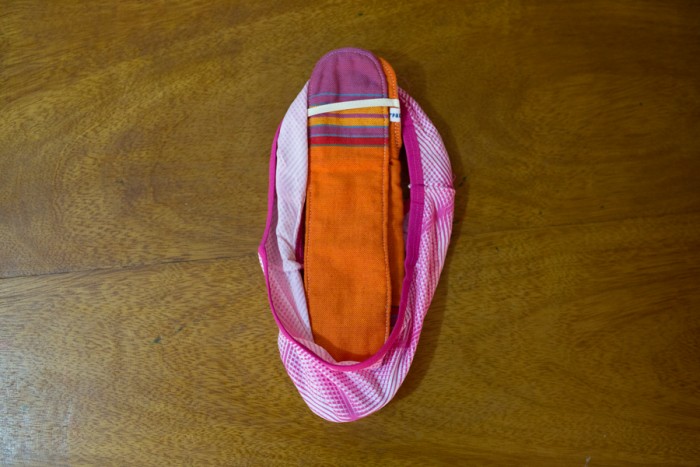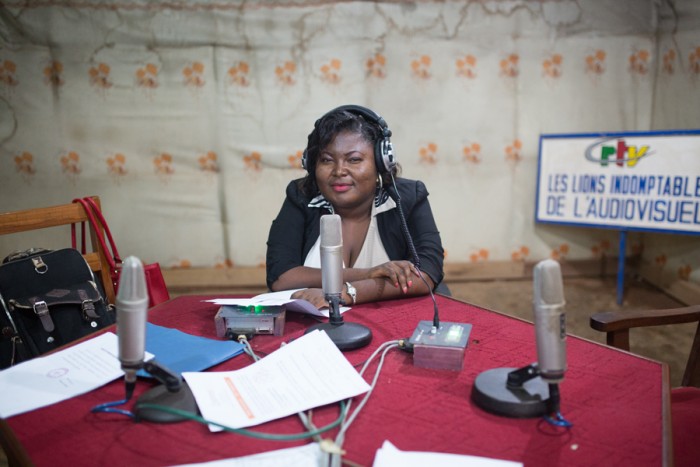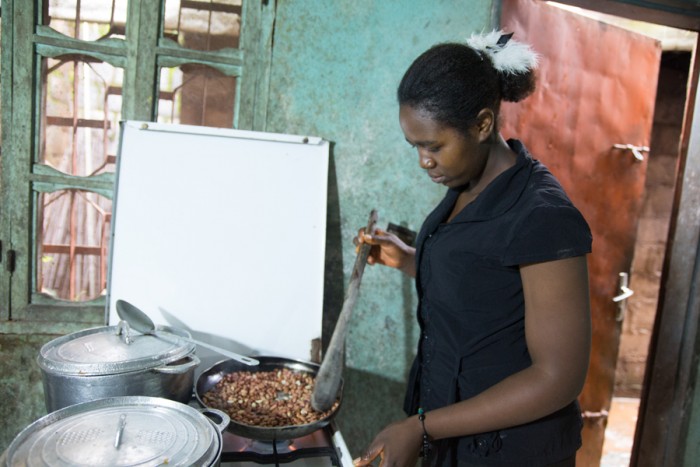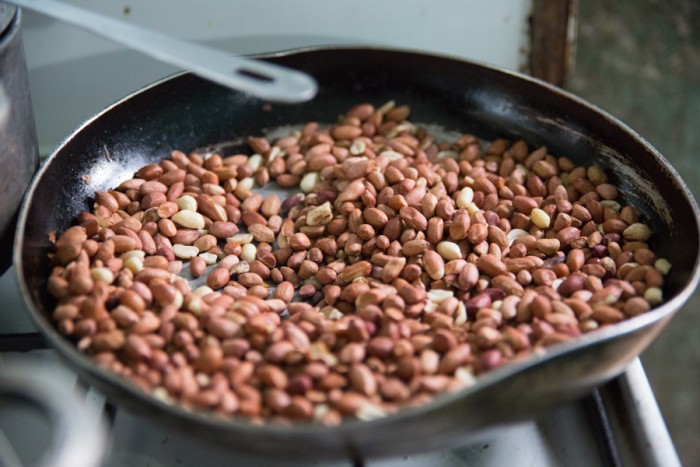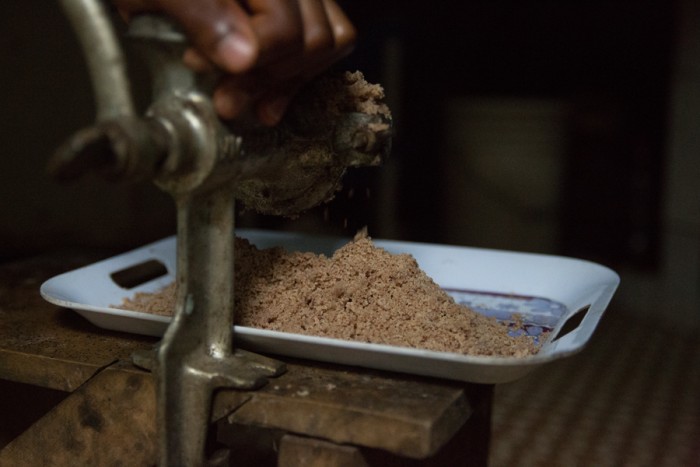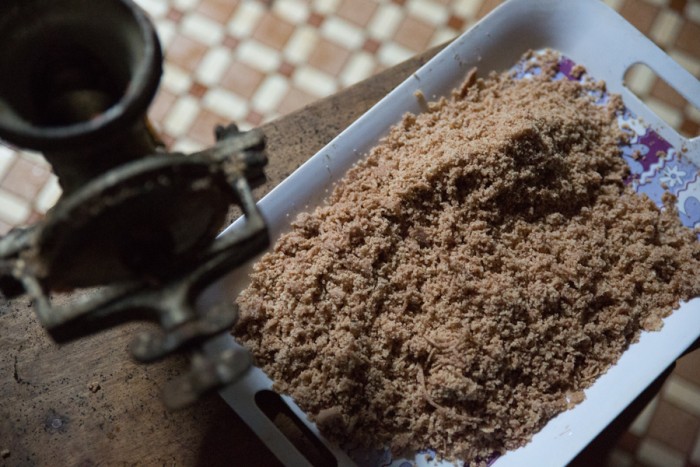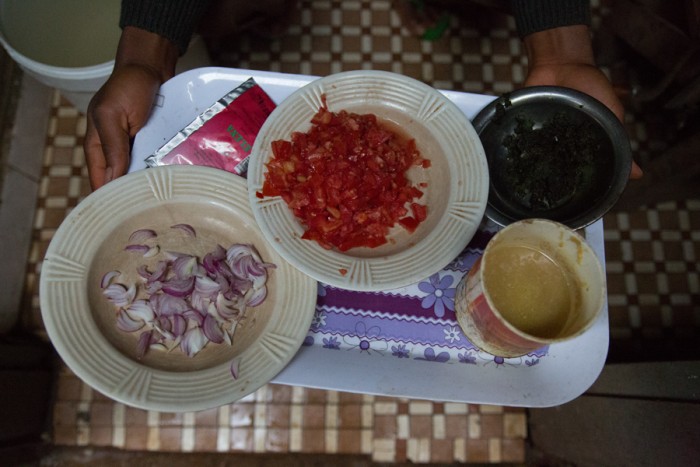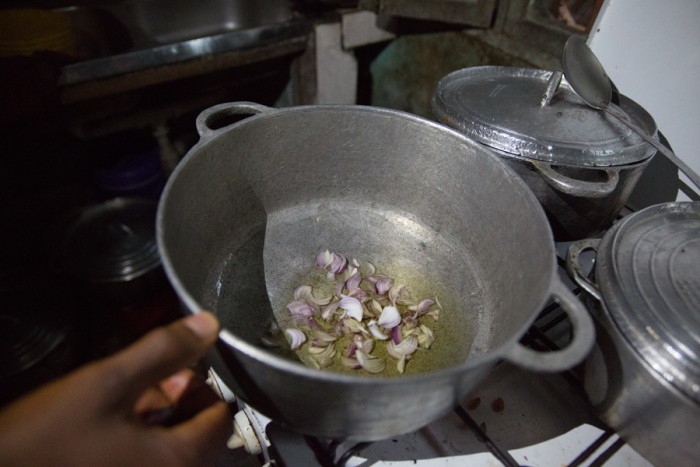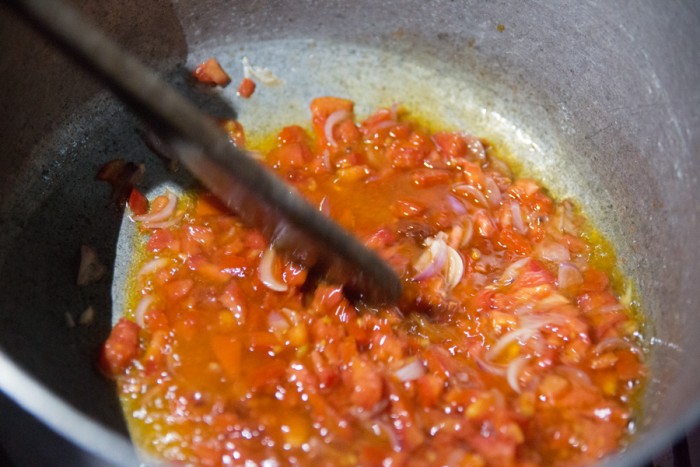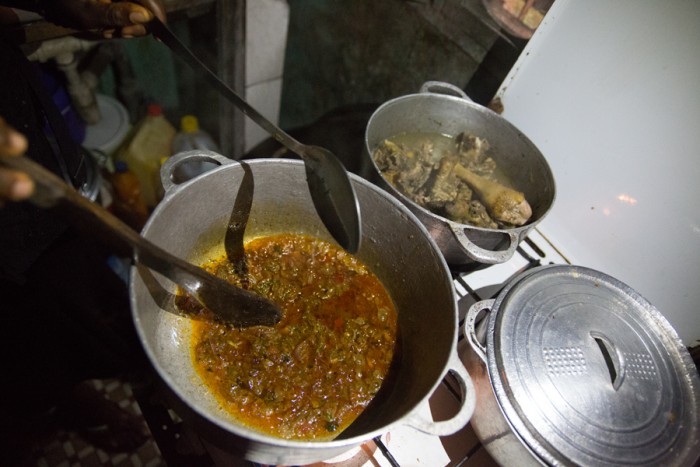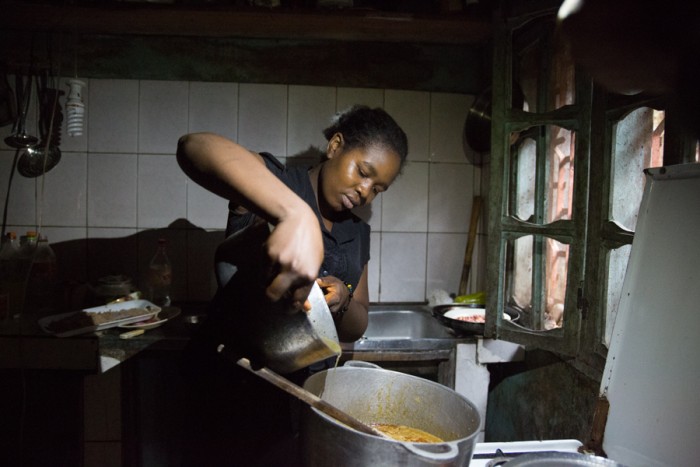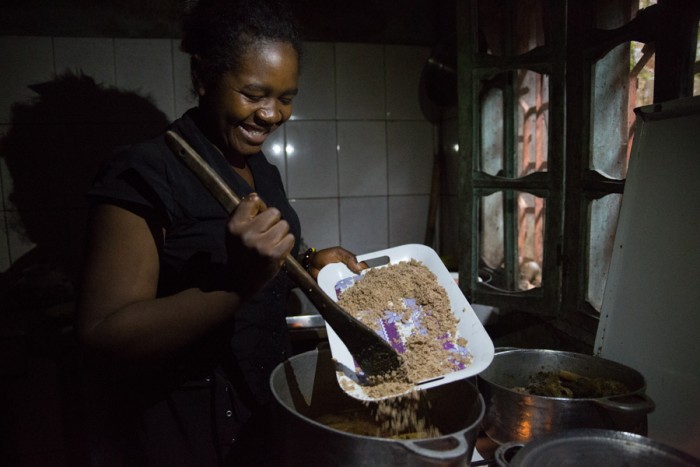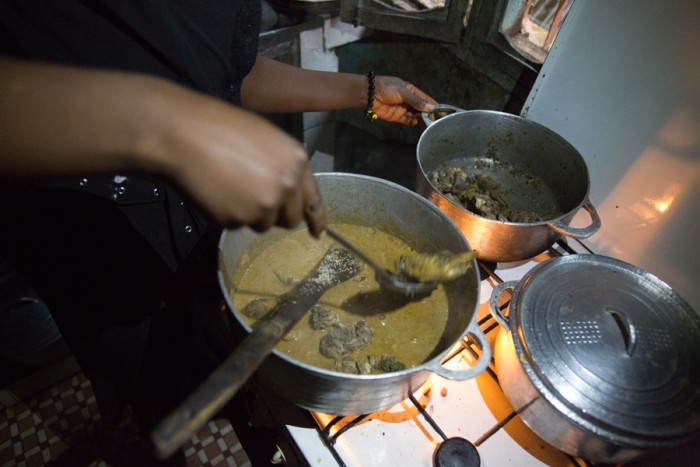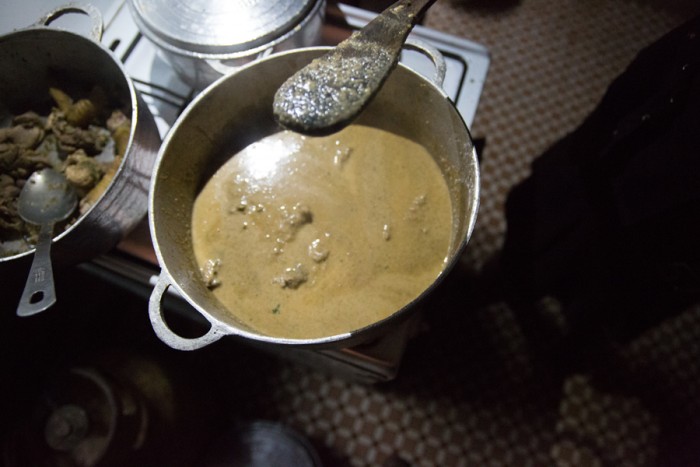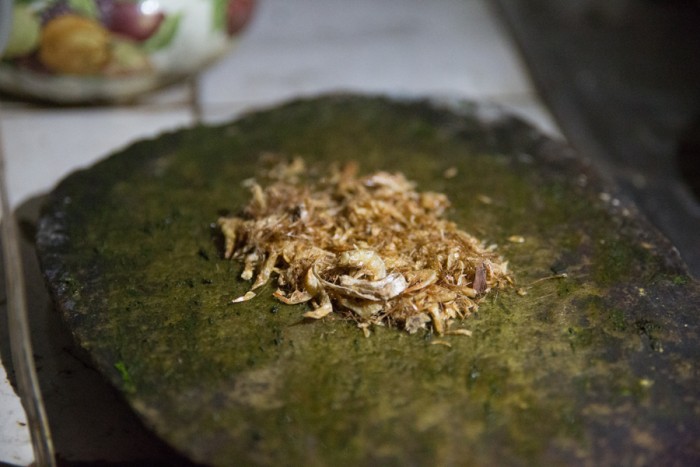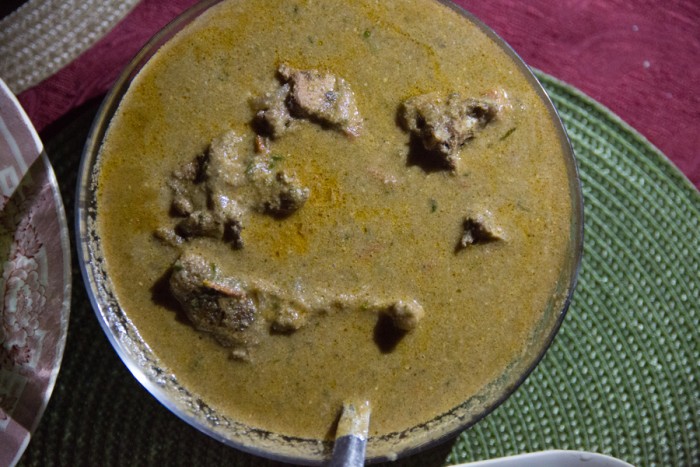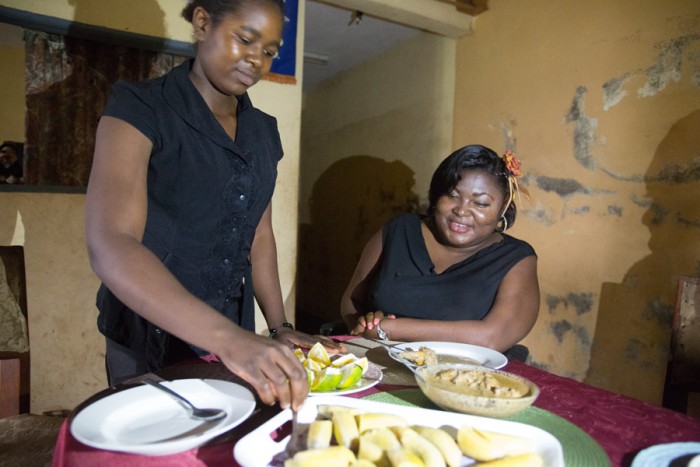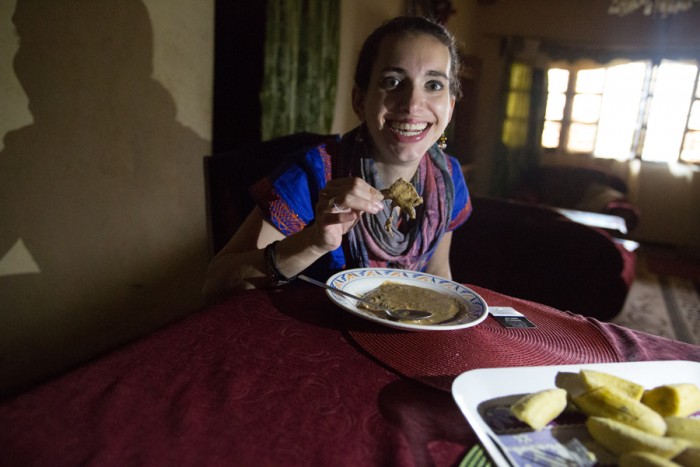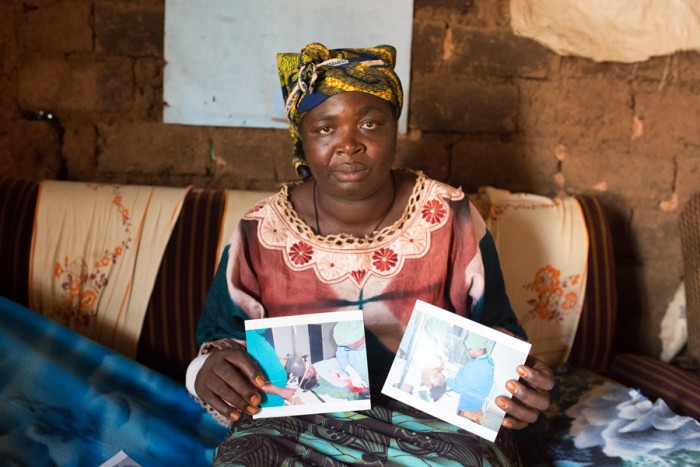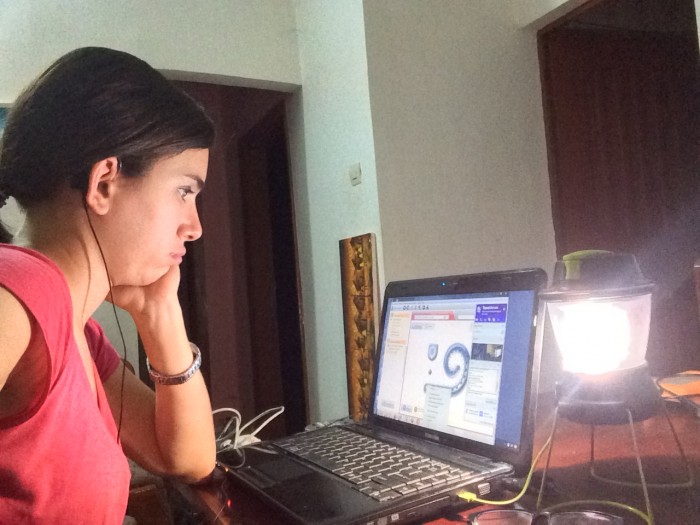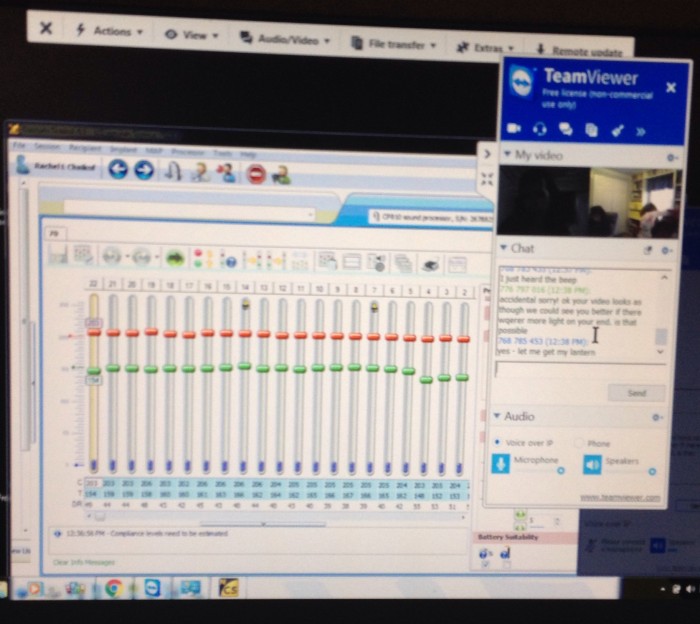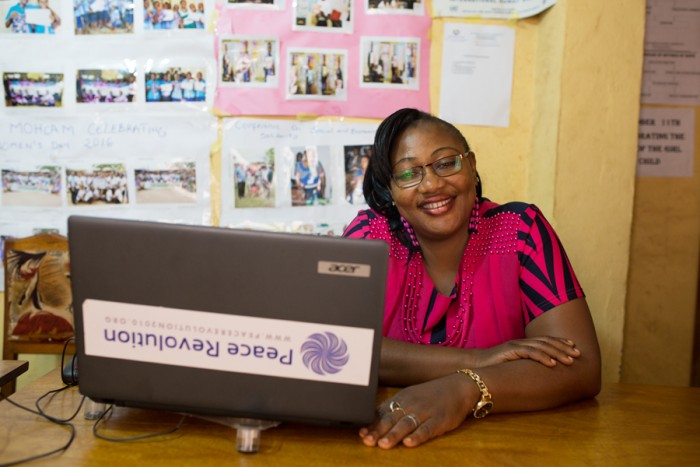September 27th, 2016 by Rachel | Tags: Disability, Peace Corps, Persons with Disabilities of Cameroon, Photography | 2 Comments »
During the last seven months of my Peace Corps service, I am featuring photographs and stories of several persons with disabilities living in Cameroon. All the photos are part of a series called “Persons with Disabilities of Cameroon.” The goal of presenting photographs and their stories is to create better awareness about the plights that persons with disabilities face in a developing country. When I return to the US, I hope to exhibit this series in a gallery and publish a book to educate others about persons with disabilities living in developing countries as this topic is so rarely discussed in the media.
Hilda Bih is one of the very few women with disabilities who live in upper middle class in Cameroon. In spite of having a successful career as a radio journalist and Washington Mandela Fellow and having greater financial means than most women with disabilities, she still faces barriers.
“I have Muscular Dystrophy and I only got the diagnosis a year ago. It was first noticed when I was about four years old and was not able to figure out what the problem was. My parents only noticed that I was losing mobility as time went by but we had no answers from hospitals and other places. My parents noticed I was having trouble walking and holding things. I grew up becoming weaker and it got harder to walk. At a certain point people had to be carrying me to school. I started using a wheelchair at the age of about 14 years old. I have been on the wheelchair ever since. I consider myself quadriplegic because I have lost almost all use of my limbs.”
“I got the diagnosis when I had the chance to attend a conference organized by U.S. based organization known as the Speak Foundation which assists people with Muscular Dystrophy in 2015. During the conference, they provided genetic testing kits for those who have never had the diagnosis. And the results confirmed that I have it. I have been suspecting it because I have done personal research on the Internet and by reading books prior to it.”
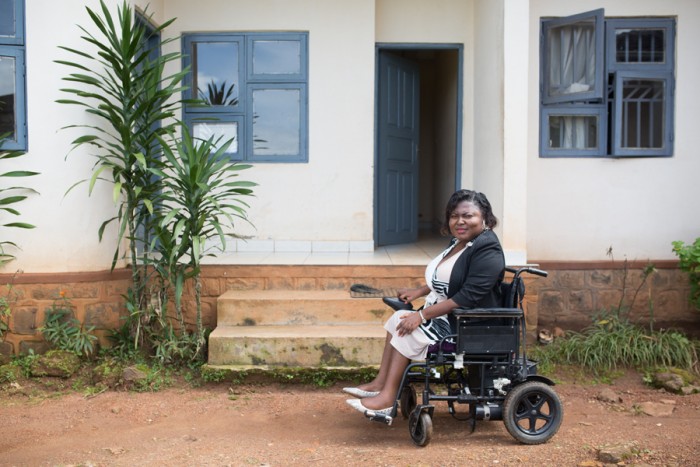
“One of the main barriers is still pretty much accessibility and getting around. Because as you notice the infrastructure is not properly adapted which means I am cut off from going to lots of places. Many buildings have staircases and elevators are practically almost non existent. Accessibility is an issue.”
“As you noticed, I am not married. I think the principle reason is because in my country and context, women with disabilities are still considered liabilities. Such that it is hard for men to consider a woman with disability as potential wise or partners. People look at me and what they say is not that I am a successful, hardworking and beautiful and intelligent women. They see me as more of a woman with disability. So that makes it difficult to establish relationships and live a more fulfilling life as a woman.”
“And another thing is even through I am successful in my career, I still feel that I sometimes have to live below standard because the cost of living as a woman with disability is way higher. Since there is no support from the state, I have to fend for myself to meet all of the needs I have as a woman with disability. “
September 25th, 2016 by Rachel | Tags: Food, Peace Corps, Recipe | No Comments »
Hilda Bih invited me to her home to teach me how to make peanut butter soup, a Cameroonian dish, which is actually known as groundnut soup. Peanuts, which is also known as groundnuts, are very commonly found in Cameroon. Unlike in the US, they’re not used as spreads but instead they’re used in different ways such as sauces for pastas, meats and vegetables and as soups. Hilda Bih and her personal assistant showed me how to prepare it in their home without electricity. They normally have electricity, but like anywhere in Cameroon, it can go out from time to time and so, lights just so happened to be out and we had to prepare it in the dark. The soup was very delicious, and it does have the good peanut butter taste that all Americans love to have on their bread or crackers. Adding chicken to the soup really made it even more filling. This recipe makes enough soup for four to six people.
Ingredients:
- 4 cups of ground peanuts or peanut butter
- 4 cups of chicken stock
- 1 cup of ground ginger
- 1 cup of chopped tomatoes
- 1/2 cup of chopped onions
- 1 cup of variety of chopped greens such as celery, parsley and water leaves
- 1/4 cup of shredded dry crayfish (other shredded dry fish can be used)
- 2 tablespoons of oil
- 1 pound chicken
Direction:
- Cook the chicken if it has not yet been cooked.
- Grind the peanuts if they’re not ground.
- Ground the ginger if it’s not grounded.
- Cut the tomatoes, onions, and greens into small pieces.
- Put the oil into the pot and turn the stove on to medium heat.
- Put in chopped onions.
- Put in chopped tomatoes and stir the tomatoes and onions with oil.
- Put in chopped greens and stir the vegetables with the oil.
- Pour in 1 cup of chicken stock and stir.
- Pour in the ground peanuts into the pot with the vegetables and chicken stock and stir.
- Pour in the rest of the chicken stock and stir.
- Put in the chicken into the soup mix and stir.
- Pour in a few tablespoons of water if the consistency is too thick.
- Pour in the dry crayfish.
- Let the pot sit boiling for about five minutes.
- Stir for a couple of minutes after boiling.
- Serve and eat the chicken with your fingers, which is customary in Cameroon.
September 18th, 2016 by Rachel | Tags: Disability, Peace Corps, Persons with Disabilities of Cameroon, Photography | No Comments »
During the last seven months of my Peace Corps service, I am featuring photographs and stories of several persons with disabilities living in Cameroon. All the photos are part of a series called “Persons with Disabilities of Cameroon.” The goal of presenting photographs and their stories is to create better awareness about the plights that persons with disabilities face in a developing country. When I return to the US, I hope to exhibit this series in a gallery and publish a book to educate others about persons with disabilities living in developing countries as this topic is so rarely discussed in the media.
This is a very dark but powerful and real story about a woman named Helen who became disabled from gender-based violence. Her stepson cut her arms with machetes because she said “no” to his requests for sex and reported him to the fon of her village.
“I am a disabled woman today because my husband died. Before he died, he shared his property among us. I was the last wife of five wives. Our husband shared us land. I constructed on my own land before he died. After two years he died, my stepson, the child of the second wife, 37 year old man was in Sangmalima, a village in Center region, and came to my village, Awing. As he came back, he came in my compound. So he said before I continue to live in my own compound, I must be his wife. Before I use any of my husband’s property I must be his wife or else ‘I will kill you and your children.’ After he said that, he was doing all possible things to have a sexual relationship with me. He will try his best to force me to have sex with him. I refused the first day and ran to the palace and complained to the fon of Awing that my stepson is coming and forcing me to have sex with me. When the fon called him to the palace and asked him, he refused and said he did not do anything like that. Then the fon said to him, ‘We know she’s your father’s wife but you don’t have to force her to be a wife because you don’t force a woman to be a wife.’ But he did not obey the fon and kept coming after me. I went back to complain to the fon. The fon said I should go to the police station and give a complaint to the police. Even though I took the complaint to the police, he kept coming after me. He set my farm on fire to burned me and my children in the house. The police came and saw everything. But he doesn’t stop coming. On the 19th of December 2013, he came and hid in my compound on top of a tree and watched my children leaving for school. I was alone at home. He jumped down from the tree into the house and told me, ‘since you refused to be my wife and you have exposed me, I will cut your head and put in my bag.’ When he came to attack me, he had a machete, dagger, and a bag. ‘If I am able to kill you, I will be able to kill all your children. And everything my father gave you.’ As he was speaking to me, he was cutting me at the same time. Because I was protecting my neck from the machete, that’s how I got injuries on my hands,” Helen holds her arms up and waves her arms across her face.
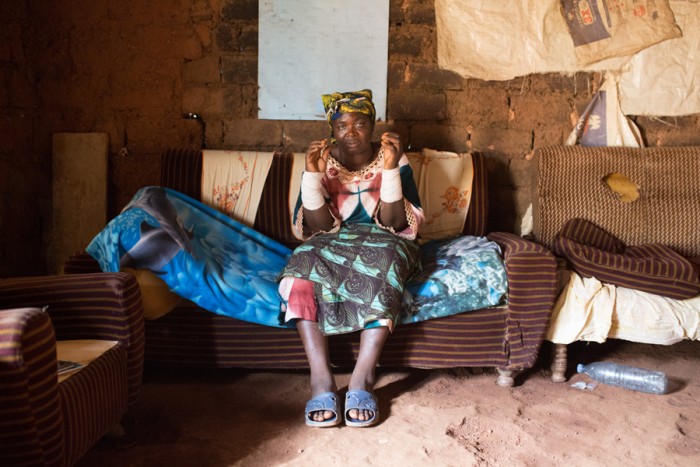
“He was cutting me and I was shouting, ‘Jesus I am dying alone.’ Nobody was around to help me. When I fell down and unconscious and bleeding, he thought I was dead. He took my phone and left. When I gained conscious, I was lucky to find myself among people. At the technical school where my children attended, one of the teachers came to me using first aid box from the school but it was enough because of the bleeding. Bleeding was very persistent. He went to the police station to make a call for emergency. One of my daughters went to the palace and told the fon, ‘My mother has been butchered”. I was lying there with one of my daughter. As I was lying, I died. My soul came out of my body and flowed to our compound. Then my soul entered my compound and met my father and presented myself to my father, ‘I am presenting to you myself how my stepson has violated me.”
“Then my father said to me, ‘Go back and meet your children. You are abandoning them who?’
“I was standing and still looking at my father, ‘Do you know how much pain I am feeling?'”
“And my father turned and told my mother, ‘Close the door and don’t allow her to enter.'”
“Then he said to me, ‘Go back.’ My soul flowed back into my body.
“I got up. I see people crying. I said, ‘Why are you crying.'”
“They said, ‘We see you dying.'”
“I said, ‘Did you see my father.'”
“They said ‘No.’ Then I was thirsty. One of the children give me some small water to drink. They put some water in my mouth. So after that the police come with a vehicle and took me to the Awing health center. That’s when they stitched me to stop the bleeding They believed if they didn’t stitch me, I would die. After that, they transferred me to the People’s Clinic Ngomngaham in Bamenda. I was taken to operation and properly treated. I stayed at the hospital for three to four months. I then had plaster for one year. The bones are still not yet joined. That’s why I still have bandages on my arms.”
“What happened to the stepson?” I asked her.
“He’s now in prison in Upstation. But his family is against me and thinks I’m lying.”
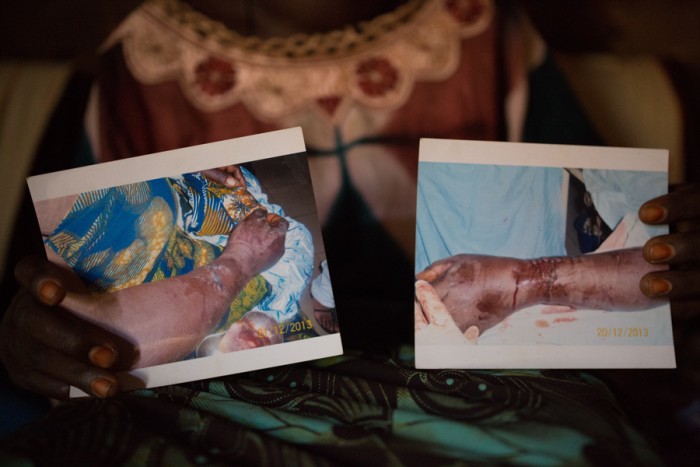
September 17th, 2016 by Rachel | Tags: Cochlear Implant, Hearing Loss, Peace Corps | 4 Comments »
When I first received my Peace Corps invitation to serve in Cameroon over two years ago, one of my first reactions was, “Cameroon? But there is no cochlear implant center there? Did Peace Corps really say it’s OK for me to serve there? If they say so, then no problem. I can just get remote MAPping.” I had recalled reading an article about Bill Shapiro, an audiologist at New York University, doing remote MAPping with a cochlear implant recipient in Uganda. In Cameroon, there is absolutely no support for cochlear implants. While I could travel to South Africa or back to the US if my hearing were to get bad and need tuning up, I did not need to do it.
Earlier this year, I found that I was not hearing well in my left ear, and I needed a tune up, which is known as MAPping. So, I contacted my audiologist in Boston, Marilyn Neault. We arranged a day and time for a MAPping session. When the day came, in my home in Cameroon I pulled out my computer, connected to the internet, and opened up the MAPping software. I had the cable to connect my sound processor to the computer. I connected my sound processor to the computer. 6,000 miles across the Atlantic Ocean, in Boston, Marilyn was on her computer and through the TeamViewer software, she took over my computer and MAPped me as if we were in an audiology room together in person. She went through each electrode and checked the comfort levels, which means checking the loudest sound I could tolerate, and checked the thresholds, which means checking the softest sound I could hear. After the MAPping was done, we did a speech test via webcam. To ensure that I get the maximum sound quality, I used my Dr. Dre headphones. If Marilyn noticed I was missing a certain sound, she went back and tweaked my MAP.
The MAPping session was finished in a couple of hours. After completing the MAPping, I went on with my life in Cameroon, hearing much better.
Remote MAPping, which is also known as telepractice, is currently not done regularly. I hope this blog post can encourage more audiologists to pursue remote MAPping so that we can open up opportunities for cochlear implant recipients who aspire to join the Peace Corps and work in developing countries that do not have cochlear implant centers. The internet has come a long way in the past year in Cameroon. High speed internet is now readily accessible and affordable. I imagine the situation for internet access is similar across the continent of Africa and other parts of the world.
September 11th, 2016 by Rachel | Tags: Peace Corps, Women | 7 Comments »
I met a strong and powerful advocate for women and girls, Adah Mbah, who is dedicated and passionate about working in human rights, women’s rights, sexual reproductive health, gender equality, gender based violence, and youth development She is the founder and executive director of a non-profit organization called Mother of Hope Cameroon (MOHCAM), which focuses on improving the lives of women and girls in Cameroon, especially when it comes to domestic violence and sexual reproductive health.
She is also a researcher and is pursuing a second master’s at the Institute of International Relationships Cameroon, where she is acquiring training in peace, gender and human rights. She holds a master’s degree in Peace and International Relations from University of Dschange, a bachelor’s degree in history from University of Yaounde I, and also a diploma in 1st and 2nd grade (early childhood) education from ENS Bambili Annex and ENS Yaounde.
Because I want my American and foreign friends and family learn more about the situation of women and girls in Cameroon, I spent some time interviewing her as she has some eye-opening information to share.
When and why did you start Mother of Hope?
Mother of Hope Cameroon was created on 23 of March 2010 from a life experience of domestic violence, which I decided to share and also to improve on the lives of victims of domestic violence. As a victim of domestic violence, I went through physical, emotional, physiological and economic violence. So I decided to create Mother of Hope Cameroon to empower and educate women and girls victims in desperation.
My vision is to establish the first women and girls empowerment center for peace and security in Cameroon. Here women and girls will be educated on the laws, policies, leadership, how to propagate love, equality, peace, and justice. They will be able to build a support groups which will empower them economically, socially and politically. This will promote the culture of peace and violence extremism in homes, schools, and communities. This center will provide hope to the less fortunate, unprivileged, abused women and girls. The center will create and maintain an atmosphere where women will be able to obtain career orientations, political guidance, socially and economically support. The women and girls will become mentors for many others in their communities. This will help build resilience and sustainable communities. The fear factor will be minimized and women will be able to use the available resources to fight against all forms of marginalization, poverty, the lack of affordable health care delivery systems, drinking water and sanitation, gender-based violence such as socio-cultural, socio-economic and social-political, HIV/AIDS, female genital mutilation and breast ironing. Access to education by women still remains a great challenge with the result that it deprives them of information and economic independence. More training on information communication technology will raise awareness and more women will have access to the internet through sensitization. My purpose is to pave the way for the scared and unsure women and girls in the communities and provide justice.
What does your organization do?
We began working fully in 2013. In 2010-2012, we’re were engaged more in using the social media on the sensitization of gender based violence prevention in communities and schools in Bamenda. So in 2013, we started working and educating girls and women on sexual reproductive health rights, peace building, and justice. Also we started educating women on leadership skills and also on ending the stigma surrounding intimate partner violence. We started visiting many women groups and associations in Bamenda. Today, we have 20 women groups working with Mother of Hope Cameroon, and we’ve been able to talk to 400 women who have testified that it was important for us to talk to many other women and encourage them build creativity and leadership skills towards development.
Then we also have been educating women on human rights and also sexual reproductive health rights. Talking to women about family planning, the use of the female condom and contraceptives, sexual reproductive health and menstruation hygiene management, we realized that many women were using old clothes, towels and some unhygienic products during menstruation. So we decided to start up a campaign on sanitary pads in 2015. We started donating pads to girls in rural communities and schools. We educated them about their bodies and how to calculate their menstrual cycles. They are also taught on puberty and sex education. This is to reduce the high rate of teenage pregnancies in rural communities and keep more girls at school. We also received donations of washable pads from partners and friends from abroad which we distributed to underprivileged women and girls in rural areas, schools, and also to girls living with disabilities. These donations are accompanied with underwear and bras for adolescent girls who are really desperate. We now have a project to produce washable pads which will be able to provide training and skill building to thousands of underprivileged girls in desperation in rural communities and schools. This is an ongoing activity of the organization and we are establishing the sewing of washable pads and needs experts and partners to join her improve on the menstrual health of women and girls in Cameroon. You could donate more sanitary products to improve on the lives of underprivileged girls in schools. We also have an organizational Library to improve on the reading and writing skills of women and youths. Some of our friends and partners have also donated books and magazines for young girls to read about their body and also to improve on their language skills in schools.
Are the disposable pads expensive in Cameroon?
Yes disposable pads are expensive for poor women and girls in Cameroon. But ironically most women and girls use other measures to manage their menstrual health rather than buy pads on monthly base because they are expensive and they wish to save money. We are discouraging the use of disposable pads also because of the high rate of environmental pollution which is another means of fighting climate change. We’re now looking for partners who will join us in the promotion of washable pad manufacturing in Cameroon.
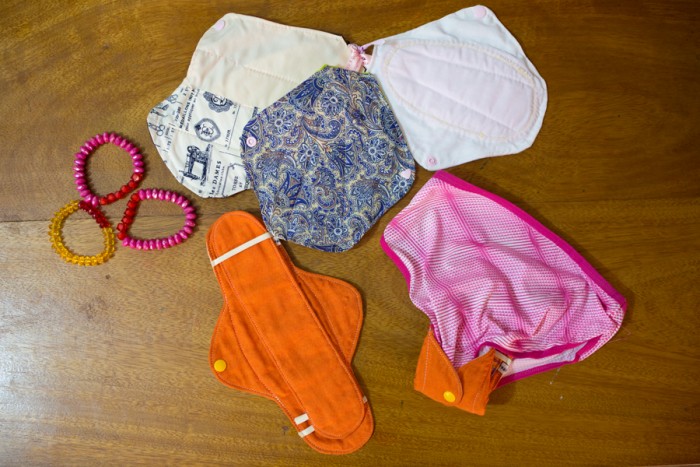
What do you do with peace building?
On peace building, we’re actually advocating for the prevention of violence extremism, preaching on peace, tolerance, interfaith dialogue, reducing trauma, and also reconnecting families who have been affected by violence. We are also advocating for United Nations Security Council Resolution 1325. The resolution reaffirms the important role of women in the prevention and resolution of conflicts, peace negotiations, peace-building, peacekeeping, humanitarian response and in post-conflict reconstruction and stresses the importance of their equal participation and full involvement in all efforts for the maintenance and promotion of peace and security. Resolution 1325 urges all actors to increase the participation of women and incorporate gender perspectives. This is made possible through the collaboration with partner organizations like the Women’s International League for Peace and Freedom Cameroon.
MOHCAM is also propagating a culture of peace building by educating youths in schools through peace clubs on the Resolution 2250. This helps the youths to actively be engaged in shaping lasting peace and also contributes to justice and reconciliation processes.
What are examples of domestic violence women and girls face in Cameroon?
Firstly, you have wife battery. You have incest and rape, breast ironing, parents neglecting their children financially. But wife battery is very high because most women don’t speak out for the fear of losing their marriages and again, the long court sessions. When you report cases, it takes a long time for the solutions for victims of violence. The ignorance of the laws and government policies is also a great hindrance for victims of domestic violence. So most victims’ domestic violence don’t report for intervention which tells from the lack of accurate statistics. Most of the women victims search for other solutions in churches for consolation.
MOHCAM also helps in seeking justice with help of legal advice to establish case files for women victims and their perpetuators taken to court. When women come here, we invite a lawyer who advises on what should be done. We’re working in collaboration with Ministry of Women Empowerment and the Family, Ministry of Youth Affairs and the Ministry of Social Affairs. We also provide counseling sessions and also pre-violence prevention sessions. We work in schools and in human rights, gender and peace clubs which we have created in ten secondary schools in the North West Region.
Give me examples of how girls or women’s lives have been changed positively because of the organization.
MOHCAM has been able to educate five hundred girls in secondary schools and rural communities on menstrual hygiene management. MOHCAM has been able to convinced 5 community leaders and counselors to set laws preventing early and forced marriage of teenage girls. MOHCAM convinced 100 mothers to send their daughters to school in fighting child trafficking. MOHCAM has also been to train 20 women leaders of women groups and associations in Bamenda on leadership skills and entrepreneurship and sexual reproductive health rights. MOHCAM established 10 gender, peace and human rights clubs in 10 secondary schools in the North West Region. MOHCAM has donated menstruation kites to 350 girls in rural communities and girls living with disabilities. MOHCAM has been able to establish three community farms for the production of vegetables to help women and girls to improve on their nutrition and fight against poverty. MOHCAM has given financial support to 20 girls in secondary schools for tuition and also for books. MOHCAM has been able to provide rents, school fees and books a student of management at the University of Bamenda who is a victim of domestic violence.
What are the biggest challenges women and girls face when having a period?
The accessibility of pads. They don’t have it. They don’t have much health education on menstruation which leads to the high rate of teenage pregnancy in schools. We’ve found out that in girls Widikum subdivision that stay away from school because of menstruation. When they get their periods, they don’t go to school. That is the plight of millions of girls in rural communities. You can only find pads on market days or in the big squares in the villages. There are absolutely no sanitary pads available in schools and rural communities. This can also be explained by the bad roads leading to these villages. This makes it difficult to have a ready supply of pads in the rural communities. Statistics which we found from the field portrays that 90% of women and girls do not use sanitary pads. They use old dresses, foams, towels and other methods to handle their menstrual heath and sanitation. Those old things affect their lives as they are often contaminated and prone to infections. The best solutions for menstrual heath and sanitation for women and girls in rural communities and in Cameroon are washable pads.
